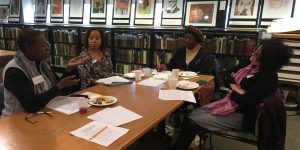Professor Micki McElya‘s book Clinging to Mammy: The Faithful Slave in Twentieth-Century America, published in 2007 with Harvard University Press, was quoted in a recent article by Kali Halloway. Titled “‘Loyal Slave’ Monuments Tell a Racist Lie About American History,” Halloway specifically references McElya’s research on the largest-black newspaper in DC in the 1920s.
Faculty
Manisha Sinha’s The Slave Cause Quoted in NYT
Professor Manisha Sinha‘s The Slave’s Cause: A History of Abolition, recipient of the 2017 Frederick Douglass Prize, was quoted in Dr. Tiya Miles’ recent NYT op-ed, “The Black Gun Owner Next Door.” Miles draws upon Professor Sinha’s utilization of “shock troops” to describe the activists involved in fugitive slave rescues.
Sharon Harris Book Award 2019 Winner: Helen M. Rozwadowski
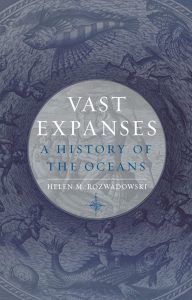 The Department is happy to announce that Professor Helen M. Rozwadowski has received the Sharon Harris Book Award for the publication of Vast Expanses: A History of the Oceans (Reaktion Press, 2018).
The Department is happy to announce that Professor Helen M. Rozwadowski has received the Sharon Harris Book Award for the publication of Vast Expanses: A History of the Oceans (Reaktion Press, 2018).
The award committee notes that: “Prof. Rozwadowski’s book is an engaging overview of the oceans from deep prehistory to the present. It focuses on the relationship between people and an environment that once seemed beyond human influence. The idea of the ocean as a limitless frontier flourished but eventually withered in the late twentieth century, as people began to confront the damage they had done through pollution and overfishing. In order for us now to produce positive environmental change, Rozwadowski concludes, “We must jettison our perception of the ocean as a timeless place, apart from humans.” This concise and readable book demonstrates the value of the humanities in addressing the planet’s looming environmental crisis.”
Congratulations!
Q&A with Professor Frank Costigliola
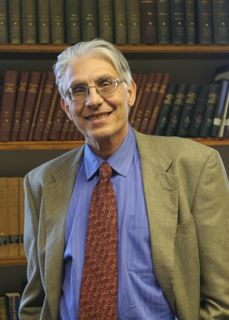 UConn Today recently interviewed Board of Trustees Distinguished Professor of History Frank Costigliola regarding the current state of U.S. foreign relations. Professor Costigliola compares Kennan’s writings to U.S.-Russia relations in the age of President Trump, historicizes and discusses the United States’ alliances, and predicts how the U.S. can rebuild allies’ trust.
UConn Today recently interviewed Board of Trustees Distinguished Professor of History Frank Costigliola regarding the current state of U.S. foreign relations. Professor Costigliola compares Kennan’s writings to U.S.-Russia relations in the age of President Trump, historicizes and discusses the United States’ alliances, and predicts how the U.S. can rebuild allies’ trust.
To read the full interview, click here.
The Encounters Series: New Directions for Public Humanities from UConn
Participants discuss wealth inequality in an Encounters Series event at the Hartford History Center at the Hartford Public Library in 2017. Image courtesy of the Encounters Series.
“The Encounters Series grew out of a desire to build connections between a land-grant university
and its state,” Brendan Kane of the UConn Department of History explains. “We wanted to move
beyond the kind of typical mode of interaction, which is the lecture or the panel,” Kane says. “I love lectures and panels, but we wanted to do things that were more active. We wanted to get UConn faculty more out into the world, making a research university that’s state-supported more accessible to the people in the communities that we serve.” With this in mind, Kane began exploring models of conflict resolution and public conversations.”
The success of the Encounters series was recently highlighted by the National Humanities Alliance in an interview with Professor Kane: https://humanitiesforall.org/projects/encounters
The line-up of recent and upcoming events, including a discussion on “Emily Mae Smith and #MeToo” on March 9, in the series can be found here:
https://humilityandconviction.uconn.edu/encounter-series/
Professor Sinha’s Article in Jacobin
At the start of the new year, Professor Manisha Sinha (Draper Chair in American History) contributed an article titled “First as Farce, Then as Tragedy” to Jacobin. In response to President Trump’s aim “to destroy the Fourteenth Amendment’s guarantee of birthright citizenship,” Professor Sinha historicizes the challenges to the Fourteenth Amendment and observes how the increased rights of corporations at the expense of the rights of citizens has enabled the “triumph of capitalism over democracy.”
Interested in learning more about the impact and legacies of the Reconstruction Era? Please join us at this spring’s Draper Conference, titled “The Greater Reconstruction: American Democracy after Civil War,” held from April 19-20. Registration and more information can be found here.
NPR Interview with Professor Alexis Dudden
On January 30th, Professor Alexis Dudden took part in reflecting on the life of South Korean activist, Kim Bok-dong, who passed away at the age of 92. Having met Bok-dong, Professor Dudden describes her as a “force of nature” and discusses Bok-dong’s experience as a sex slave for the Japanese military during World War II.
The interview aired on NPR’s “All Things Considered” and can be found here.
Professor Fakhreddin Azimi Wins Prize for Persian Scholarship
Professor Fakhreddin Azimi was recently awarded the Mahteb Mirzaei Memorial Prize for his article, “An exploration and historical contextualization of the declassified CIA/US Government documents on Iran, 1952-54”, published in the summer 2017 issue of Negah-e Nou, the premier Tehran-based Persian language quarterly. This marks the third time his Persian language scholarship has won this award. Professor Azimi’s brother was on hand in Tehran to accept the award on his behalf on November 29, 2018. In addition to multiple monographs, articles, and chapters on the politics, society, and culture of modern Iran, Professor Azimi teaches courses in medieval and modern Middle Eastern history, and graduate seminars on history and theory in the UConn History Department. Congratulations, Professor Azimi!
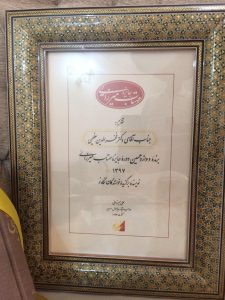
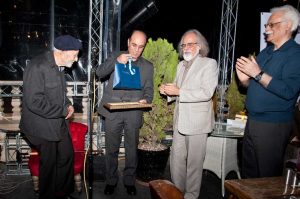
The History of the Largest Foreign-Born Population in the State
This week’s UConn Today features Professor Fiona Vernal discussing research on the West Indian community, which is – according to the US Census – the largest immigrant population in Connecticut.
“No, Kanye, That’s Not How It Happened.”
In the latest issue,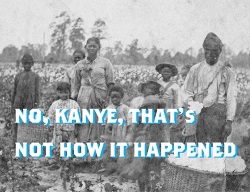 UConn Magazine talks to Professor Manisha Sinha about history lessons that tell the truth about slavery in the U.S. and more.
UConn Magazine talks to Professor Manisha Sinha about history lessons that tell the truth about slavery in the U.S. and more.
